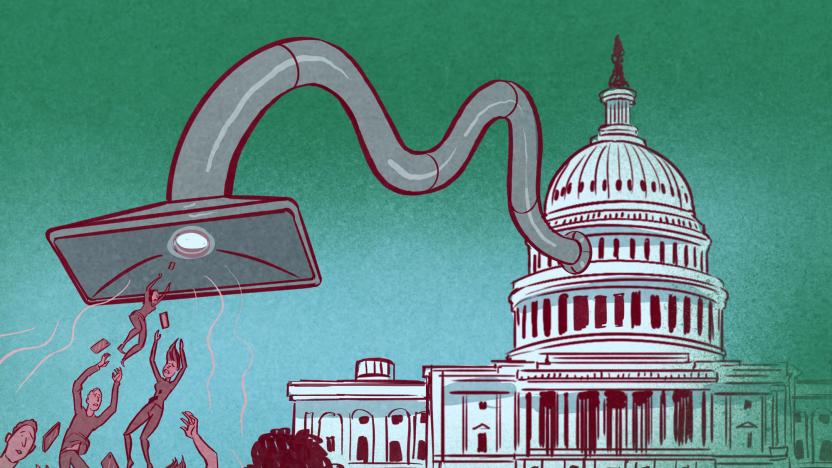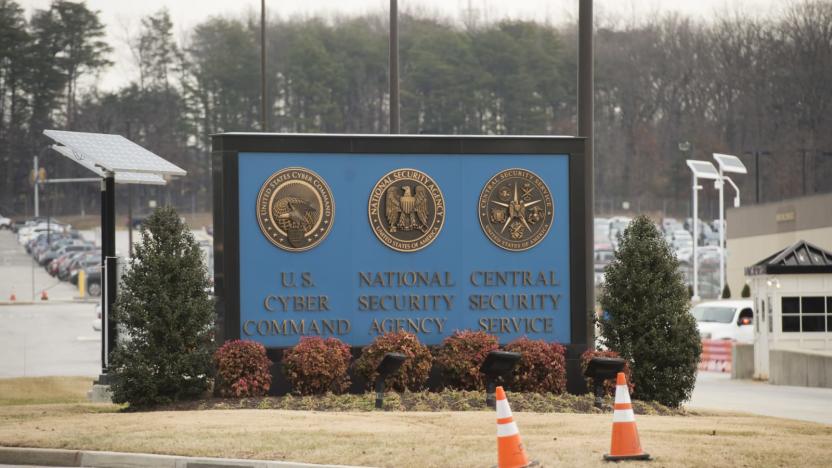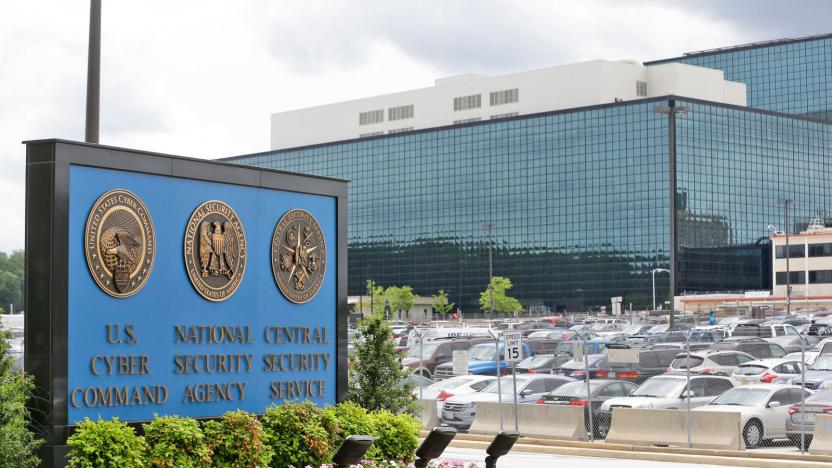patriot act
Latest

House amendment would require warrants for web history searches
Congresswoman Zoe Lofgren announced an amendment that would prohibit the collection of Americans’ internet search history and web browsing data without a warrant.

Yes, the Patriot Act amendment to track us online is real
Looks like more bad news with the renewal of the Patriot Act/USA Freedom Act — and its terrible provision to allow government collection of Americans’ internet browsing and search histories without a warrant.

Senate passes Patriot Act amendment strengthening independent oversight
Senators are currently deciding on amendments to address surveillance enabled by the Patriot Act. One measure intended to prevent warrantless collection of your search history failed, while one that strengthened independent oversight passed.

Bipartisan bill would scale back key section of the Patriot Act
Oregon Senator Ron Wyden has introduced new legislation that would attempt to reform Section 215 of the Patriot Act definitively. Democratic and Republican lawmakers in both the House and Senate have co-sponsored Wyden's Safeguarding Americans' Private Records Act.

The NSA says it stopped tracking cellphone locations without a warrant
Last year the Supreme Court ruled, in a 5-4 decision, that a search warrant is required for law enforcement to perform cellphone tower searches to track someone's location. The Daily Beast reported on a letter sent by the Office of the Director of National Intelligence (ODNI) to Senator Ron Wyden affirming that ever since that Carpenter decision, the "Intelligence community" has not sought cell-site location data or GPS records without a warrant. It had been doing that, claiming authority under the Title V of the Foreign Intelligence Surveillance Act (FISA) / Section 215 of the Patriot Act. However Section 215 of the Patriot Act is set to expire next month, and in the letter (PDF), the assistant director writing it never confirms that the Supreme Court decision means they couldn't, or wouldn't, do it in the future.

What's coming to Netflix in November: 'The Irishman' and 'Queer Eye'
November is a colossal month in the streaming ecosystem, with heavyweight newcomers Apple TV+ and Disney+ both making their debuts. Netflix doesn't plan to go quietly into the night though, as it has plenty of major titles coming to its platform over the month. Most notably, Martin Scorcese's latest mob epic The Irishman will hit Netflix November 27th -- just in time for Thanksgiving weekend. Also on the docket are The King, starring Timothée Chalamet (November 1st), and season two of The End of the F***ing World (November 5th).

NSA improperly collected even more call records than we thought
According to documents obtained by the ACLU, the NSA's problem of collecting unauthorized American phone call data is worse than we first thought. Last May, the NSA deleted more than 600 million call records that it collected in error. The agency claimed that telecoms shared information on calls unrelated to NSA targets, and in doing so, violated federal laws. To be safe, the NSA dumped a massive amount of call records and said it had gotten to the "root cause" of the problem. But a report released by the ACLU, states that just a few months later, the NSA once again obtained information about Americans' phone calls that it was not authorized to collect under Section 215 of the Patriot Act.

Netflix puts a 'Patriot Act' episode about bad internet access on DVD
The latest episode of Netflix variety talk show Patriot Act with Hasan Minhaj focuses on the digital divide. In it, Minhaj breaks down some of the many reasons why internet access is so terrible across much of the US, including the roles of carriers and the Federal Communications Commission.

France gets its own 'Patriot Act' in wake of 'Charlie Hebdo' attack
Liberté, égalité, fraternité? Maybe strike the first one off that list. While some US lawmakers are trying to pare down the Patriot Act, the French constitutional court has just allowed police to monitor pretty much anyone they want without a warrant. The "Loi Renseignement," or Surveillance Act was first proposed in the wake of the Charlie Hebdo shootings in Paris, and approved by legislators in May. It's now the law of the land, and Prime Minister Manuel Valls tweeted that "France now has a security framework against terrorism that respects liberties." However, many folks disagree with that sentiment, and France's constitutional court itself strongly opposed the lack of oversight.

Google, Apple and others list demands for spying act changes
The US Congress, Senate and White House may be torn on what to do with a key Patriot Act spying clause, set to expire on June 1st. But Google, Apple, Facebook and other tech companies in the Reform Government Surveillance coalition know exactly what they want: no more bulk data collection. Together with numerous privacy groups including the ACLU and EFF, they presented a letter to the President and both houses with two key demands. The groups asked for "a clear, strong and effective end of bulk collection practices under the Patriot Act," along with "transparency and accountability mechanisms for both government and company reporting."

The 'warrant canary' in Apple's compliance report
There was an interesting nugget we glanced over regarding Apple's report detailing its compliance with various government information requests. In the Notes section of the report, located at the very bottom, Apple writes: Apple has never received an order under Section 215 of the USA Patriot Act. We would expect to challenge such an order if served on us. So why is that so interesting? Well, if Apple had in fact received an order under Section 215 of the Patriot Act, it wouldn't be legally allowed to admit it. Consequently, if the aforementioned language is removed in future compliance reports from Apple, it would stand to reason that Apple had since received an order under the Patriot Act. And apparently, this clever little number is referred to as a warrant canary.

Calyx Institute to create ISP that keeps customer traffic private, away from prying governmental eyes
Wouldn't it be nice if we were free to surf the web free from fear of having our traffic monitored and emails scraped by the NSA? Well, if Nicholas Merrill has his way, we won't have to rely on anonymous browsers or proxy servers -- we'll have a new ISP built from the ground up to protect customer privacy. A non-profit, the Calyx Institute, will run the ISP that'll employ end-to-end encryption on web traffic, plus encrypted emails to prevent anyone other than the user, including the ISP itself, from seeing people's internet activity. Because of this structure, Calyx, quite literally, won't be able to comply with governmental requests to obtain customer traffic data under the Patriot or Foreign Intelligence Surveillance Acts. The best part is, such online privacy may cost as little as $20 a month, and Merrill has hopes to provide a similarly secure VoIP service at some point as well. Of course, the venture will only be possible if Merrill can raise the $2 million needed to get it going -- which is why he's pitching the idea to venture capitalists in Silicon Valley and the general public through crowd-sourced funding site IndieGogo. Want to help out? Hit the source below to make a donation.

Microsoft's Patriot Act admission has the EU up in arms
Last week, Microsoft quietly confirmed that cloud data stored on its European servers can still be handed over to American investigators -- and the EU is none too pleased about it. As it turns out, the revelation has shed new light on a fundamental conflict between US law and the EU's Data Protection Directive -- an edict requiring that companies notify consumers whenever sharing their personal information. The bi-lateral Safe Harbor agreement calls for similarly strict protocol, but under the Patriot Act (which trumps all else), companies like Microsoft could be forced to hand over private data without informing targeted individuals. In response, some members of the European Parliament are calling upon legislators to take action and to implement safeguards that can't be overridden by third-party governments. It remains to be seen whether or not this leads to any new laws or transatlantic tensions, but if we've learned anything, it's that Europeans take their clouds very seriously.

Microsoft: European cloud data may not be immune to the Patriot Act
If you thought you could evade US intelligence by moving to Europe and storing your dirty little secrets in Microsoft's cloud service, guess again. During this week's launch of Office 365, Gordon Frazer, managing director of Microsoft UK, admitted for the first time that cloud data stored at European datacenters could still be handed over to American officials, as outlined by US law. When asked whether Microsoft could guarantee that its EU-stored data would never leave the continent (even if requested under the Patriot Act), Frazer replied: "Microsoft cannot provide those guarantees. Neither can any other company." Because the company's headquarters are in the US, it's obligated to adhere to American laws, meaning that any of the data stored on its servers is fair game for authorities to seize and inspect. Frazer insisted that targeted users "would be informed whenever possible," but claimed that neither Microsoft nor any other US company can guarantee advanced notification. Bottom line: you're better off hiding those nefarious files the old fashioned way -- in an offshore safe deposit box.








